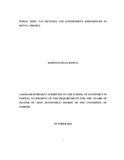| dc.description.abstract | In lieu of rising budget deficits in many countries across the world, driven by tax revenue
insufficiency in financing government expenditure, many governments have continued to
accumulate public debt due to the financing of budget deficits. In the long run, however,
persistent budget deficits as well as debt accumulation are unsustainable and pose several
problems to the economy including inflationary spirals, depressed growth, higher
associated poverty levels and consequently fiscal crisis. To offer any policy prognosis
towards controlling and consequently reducing budget deficit as well as public debt and
associated problems requires an understanding of the relationship between public debt,
tax revenue and government expenditure. This study utilized the present value borrowing
constraint (PVBC) to study the relationship between public debt, tax revenue and
government expenditure in Kenya, for 1960-2011. Annual time series data for total public
debt, tax revenue and government expenditure were converted into their respective real
values by dividing their respective nominal values by the Consumer Price Index (CPI).
Data was collected from Kenya economic surveys from 1960-2013. Because data was
available in fiscal years, it was converted to calendar years by splicing. Augmented
Dickey Fuller and Philips Perron unit root tests were employed to establish the stationary
properties of the series while the Johansen and Juselius co-integration techniques were
used to determine presence of linear long run economic relationships in the series.
Because cointegrating relationships invalidated ordinary estimation techniques, to
achieve these relationships, which formed the objectives of the study, data was analysed
using vector error correction model (VECM) with correlation analysis. The study found
that public debt responds to both tax revenue and government expenditure particularly in
the long run. There was strong positive correlation between public debt tax revenue and
government expenditure and all correlation coefficients were statistically significant. | en_US |

